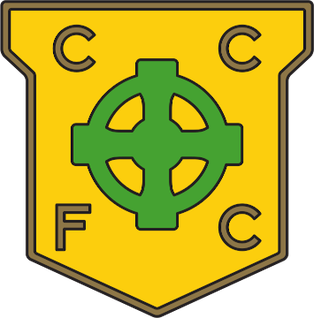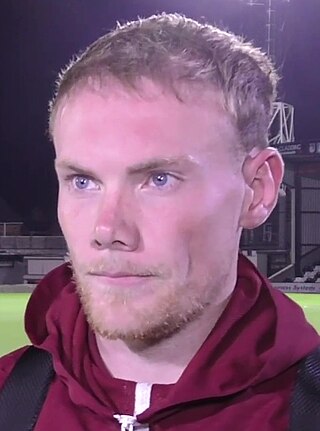
Dundalk Football Club is a professional football club that competes in the League of Ireland First Division. The club is based in Dundalk and its home ground is Oriel Park. The club crest is three martlets on a shield, which was adopted from the town's old coat of arms, and the team colours are white shirts and black shorts.

Cork Celtic F.C., originally Evergreen United F.C., was an Irish football club based in Cork. They played in the League of Ireland between 1951 and 1979 and played their home games at Turners Cross. In 1974, they were League of Ireland champions and the following season they reached the second round of the European Cup.

James Jones was a Northern Irish footballer who played as a forward. He is the leading goalscorer in the history of Irish League football with a total of 647 goals. According to RSSSF, he scored more than 809 goals in official matches, which makes him one of the most prolific goal scorers of all time.
Paul Doolin is an Irish former footballer and manager. Who mostly recently managed NIFL Premiership side Portadown.

Dundalk Rugby Football Club is an amateur Irish Rugby football club from Dundalk, County Louth. The men's team compete in Division 1B of the Leinster League.
Declan 'Fabio' O'Brien is an Irish former professional footballer who played as a striker. He is Drogheda United's top goalscorer of all time.

Christopher Stephen Forrester is an Irish professional footballer who plays as a midfielder for St Patrick's Athletic in the League of Ireland Premier Division. He has also previously played for Bohemians, Peterborough United, Aberdeen and the Republic of Ireland under-21's. In March 2016 he was called up to the Republic of Ireland senior squad but has yet to be capped.
Darragh Markey is an Irish professional footballer playing for League of Ireland Premier Division club, Drogheda United, having previously spent six seasons with St Patrick's Athletic, the club he started his professional career with.
Georgie Poynton is an Irish footballer who plays for NIFL Premiership side Newry City. He has previously played for Dundalk, Bohemians, Saint Patrick's Athletic, Waterford, Shelbourne and Drogheda United. He competed at underage level for the Republic of Ireland national under-19 football team, and was named 2016 FAI Under-19 Player of the Year.

Ciarán Kelly is an Irish professional footballer who plays for EFL League Two club Bradford City. He previously played for St Patrick's Athletic, the club where he started his professional career. He has also spent one season at Drogheda United as well as 3 seasons with Bohemians, where he was loaned out to NIFL Premiership side Ballymena United for 6 months.

The History of Dundalk Football Club (1903–1965) briefly describes the introduction of association football to the town of Dundalk, Ireland in the pre-World War I period, then subsequently covers the period from the formation of the Dundalk G.N.R. Association Club in September 1903 to the takeover of the club as a public limited company in January 1966. This page also includes short articles about events and people that were an integral part of that period of the club's history.

The History of Dundalk Football Club (1966–2002) covers the period from the takeover of the club as a public limited company in January 1966 to the end of the 2001–02 season, when Dundalk won the FAI Cup, but were also relegated to the League of Ireland First Division. It also includes short articles about some of the events and people that are an integral part of that period in the club's history.
Dundalk entered the 1987–88 season as the League Cup holders from 1986–87, having won that competition and finished as runners-up in both league and FAI Cup. 1987–88 was Turlough O'Connor's third season as manager, and was Dundalk's 62nd consecutive season in the top tier of Irish football.
Dundalk entered the 1981–82 season, having finished as runners-up to Athlone Town the previous season. They were the holders of both the League Cup and the FAI Cup, having achieved their first domestic cup double. In the process, they had qualified for the Cup Winners' Cup. 1981–82 was Jim McLaughlin's eighth season as manager, and was Dundalk's 56th consecutive season in the top tier of Irish football.
Dundalk entered the 1978–79 season, having won the previous season's League Cup and Leinster Senior Cup. But they had finished in a disappointing 11th place in the League, which meant there would be no European football in the new season. 1978–79 was Jim McLaughlin's fifth season as manager, and was Dundalk's 53rd consecutive season in the top tier of Irish football.
Dundalk entered the 1975–76 season on the back of a fifth-place finish the previous season. 1975–76 was Jim McLaughlin's first full season as manager, having replaced John Smith in November 1974. It was Dundalk's 50th consecutive season in the top tier of Irish football.

Dundalk entered the 1966–67 season on the back of a disappointing eighth-place finish in the League and a sixth-place finish in the Shield the previous season. 1966–67 was Alan Fox's first season as player-coach, having been appointed by the club's new board of directors in August. It was Dundalk's 41st consecutive season in the top tier of Irish football.
Dundalk G.N.R. made their debut in the Free State League, the top tier of Irish football, in 1926–27. They had played the previous four seasons in the Leinster Senior League. The team was managed by Joe McCleery, previously of Belfast Celtic F.C., who used his connections to Northern Irish football to ensure a supply of players for the season ahead. Home matches were played at the Dundalk Athletic Grounds, but on weekends when the Athletic Grounds were unavailable, matches would usually move to the Carroll's Recreation Ground.
Mark Doyle is an Irish professional footballer who plays as a winger or striker for USL Championship club Rhode Island, having previously spent six seasons at Drogheda United and two seasons with St Patrick's Athletic.










